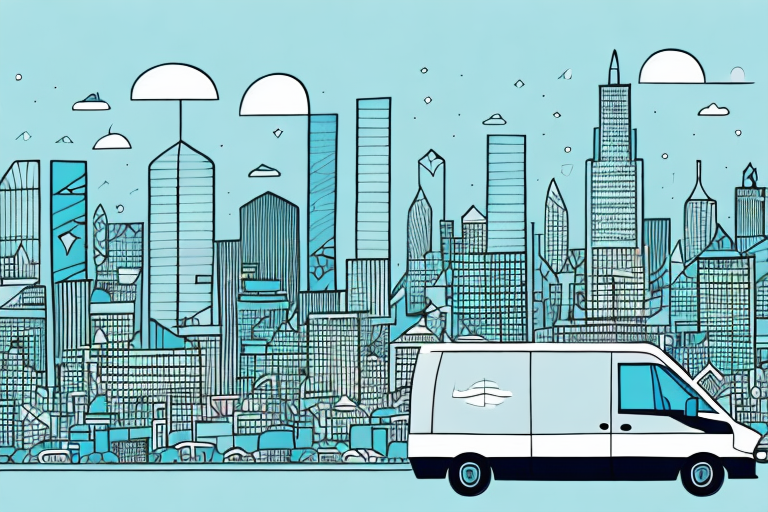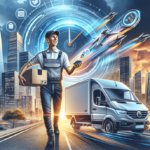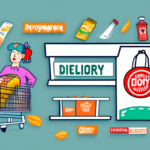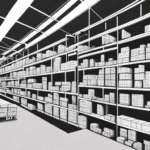The Rising Popularity of Delivery Startups
Over the past few years, delivery startups have surged in popularity as consumers seek more convenient shopping options. These companies offer a wide array of products and services, including grocery, food, and household goods delivery. With many providing same-day or even two-hour delivery options, customers can save time and avoid the hassle of visiting physical stores.
Convenience and Time-Saving Benefits
The primary appeal of delivery startups lies in their ability to deliver products directly to consumers' doorsteps quickly. For busy individuals and families, this convenience translates to significant time savings and increased efficiency in daily routines.
Environmental Advantages
Delivery startups also contribute to environmental sustainability by optimizing delivery routes and consolidating shipments. This reduces the number of vehicles on the road, lowering carbon emissions and minimizing traffic congestion. According to a EPA report, optimizing logistics can significantly decrease the environmental footprint of delivery operations.
Impact on Traditional Retailers
The rise of delivery startups has profoundly affected traditional brick-and-mortar retailers. As more consumers prefer online shopping with home delivery, physical stores face declining foot traffic and sales.
Adapting to the Digital Shift
In response to changing consumer behaviors, many traditional retailers are investing in their own delivery services or partnering with third-party providers to remain competitive. For instance, Target has expanded its same-day delivery options through partnerships with services like Shipt.
Supply Chain Disruptions
Delivery startups often source products directly from manufacturers or wholesalers, bypassing traditional retail supply chains. This can lead to lower prices for consumers but creates pressure on traditional retailers to reduce their own prices or enhance their value propositions.
Technological Innovations Driving Success
Technology is at the core of delivery startups' success, enabling them to offer fast, reliable, and personalized services.
Route Optimization and Data Analytics
Advanced algorithms and data analytics are used to optimize delivery routes, reducing delivery times and operational costs. Real-time tracking systems allow customers to monitor their orders, enhancing transparency and trust.
Emerging Technologies
Delivery startups are investing in cutting-edge technologies such as drones and autonomous vehicles to further streamline operations. Companies like Amazon are pioneering drone delivery services to expedite shipping processes.
Business Models and Economic Impact
Most delivery startups operate on a gig economy model, leveraging a network of independent contractors to facilitate deliveries. This model offers flexibility and scalability but also presents challenges related to worker classification and job security.
Revenue Streams and Pricing Strategies
Startups typically earn revenue through delivery fees, commissions on transactions, and subscription services. For example, Instacart offers a subscription model that provides customers with benefits like free delivery and reduced service fees.
Economic Contributions
Delivery startups contribute to local economies by creating job opportunities and supporting small businesses through expanded market reach. According to a report by the Statista, the online food delivery market is projected to grow significantly, further driving economic growth.
Challenges and Regulatory Issues
Despite their rapid growth, delivery startups face several challenges, including regulatory hurdles, high operational costs, and intense competition.
Worker Classification and Legal Disputes
A major regulatory challenge is the classification of workers as independent contractors versus employees. Legal disputes over worker rights and benefits are ongoing in many regions, impacting the business models of delivery startups.
Environmental and Infrastructure Concerns
The increased number of delivery vehicles can lead to traffic congestion and higher emissions, counteracting the environmental benefits of optimized delivery routes. Startups are exploring eco-friendly alternatives such as electric vehicles and sustainable packaging to address these concerns.
Future Trends and Predictions
The future of delivery startups is shaped by continuous innovation and evolving consumer expectations.
Expansion into New Markets
Delivery startups are expanding beyond traditional sectors like food and retail, venturing into healthcare, pharmaceuticals, and even grocery delivery. This diversification helps them tap into new revenue streams and meet broader consumer needs.
Advancements in Automation
Investment in automation technologies, including robotics and artificial intelligence, is expected to enhance efficiency and reduce delivery times. Autonomous delivery vehicles could become more prevalent, significantly transforming the logistics landscape.
Sustainability Initiatives
As consumers become more environmentally conscious, delivery startups are increasingly focusing on sustainable practices. This includes the use of renewable energy sources, eco-friendly packaging, and carbon offset programs to mitigate environmental impact.
Enhancing Customer Experience
Delivery startups prioritize exceptional customer service to differentiate themselves in a competitive market.
Real-Time Tracking and Transparency
Providing real-time tracking and status updates allows customers to stay informed about their deliveries, enhancing the overall shopping experience. Features like estimated delivery times and live notifications contribute to customer satisfaction.
Personalization and Customization
Leveraging customer data, delivery startups offer personalized recommendations and tailored promotions. This not only improves user experience but also fosters customer loyalty and repeat business.
Social and Economic Impact on Communities
Delivery startups play a significant role in shaping local communities both socially and economically.
Job Creation and Economic Support
By creating jobs for delivery drivers and supporting local businesses through increased sales opportunities, startups contribute to the economic vitality of communities.
Access to Essential Services
Delivery services enhance access to essential goods and services for individuals who may have mobility issues or live in underserved areas, promoting greater inclusivity and equity.
Balancing Growth with Community Needs
While delivery startups drive economic growth, they must also address potential negative impacts such as reduced patronage for local brick-and-mortar stores and increased traffic in residential areas. Finding a balance between growth and community well-being is crucial for sustainable development.
Conclusion
Delivery startups are revolutionizing the way we shop by offering unparalleled convenience, leveraging advanced technologies, and contributing to economic growth. Despite facing significant challenges, their ability to innovate and adapt positions them well for continued success. As the industry evolves, it will be important to address regulatory and environmental concerns to ensure that delivery startups can sustainably meet the needs of consumers and communities alike.



















